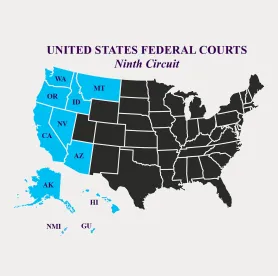The US Court of Appeals for the Ninth Circuit addressed contributory trademark infringement for the first time, finding that specific knowledge is required for liability to attach. Y.Y.G.M. SA, DBA Brandy Melville v. Redbubble, Inc., Case Nos. 21-56150; -56236 (9th Cir. July 24, 2023) (Callahan, Nelson, Thomas, JJ.)
Brandy Melville manufactures clothing and home goods and owns multiple trademarks, including the Brandy Melville Heart and LA Lightning marks. Redbubble is an online marketplace where individual artists upload designs for printing on demand on various articles and Redbubble handles payment, manufacturing and shipping.
In 2018, on two consecutive days, Brandy Melville notified Redbubble of infringing products on its marketplace. Redbubble removed them. One year later, Brandy Melville sued Redbubble for trademark infringement. The district court granted summary judgment to Redbubble on several of its claims. The case then went to trial on Brandy Melville’s contributory infringement and counterfeiting claims. The jury found Redbubble liable for contributory counterfeiting of the Brandy Melville Heart and LA Lightning marks, contributory infringement of those marks and contributory infringement of various unregistered trademarks. However, the court granted Redbubble judgment as a matter of law (JMOL) as to the contributory counterfeiting claim for the Heart mark. Brandy Melville moved for a permanent injunction, attorneys’ fees and prejudgment interest. The district court denied each of Brandy Melville’s motions.
Redbubble appealed the denial of JMOL on contributory infringement claims and the finding of willful contributory counterfeiting of the LA Lightning mark. Brandy Melville appealed the grant of JMOL on contributory counterfeiting of the Brandy Melville Heart mark and the denial of permanent injunction, attorneys’ fees and prejudgment interest.
Addressing Redbubble’s appeal, the Ninth Circuit considered contributory infringement and contributory counterfeiting together. The issue of the applicable standard in questions of contributory liability was novel for the Ninth Circuit. The Lanham Act provides a cause of action when a party intentionally induces trademark infringement or when the party continues to supply products to a third party, despite knowing or having reason to know that the third party is engaging in trademark infringement. This case dealt with the latter.
In other contexts, the Ninth Circuit has applied the “knows or has reason to know” standard as satisfying the willful blindness (in lieu of actual knowledge) element. Willful blindness requires a subjective belief that infringement is likely occurring and deliberate actions were taken to avoid knowledge of that infringement. Redbubble argued that willful blindness requires specific knowledge, while Brandy Melville argued that there is a duty to take reasonable corrective action once a party obtains general knowledge of infringement. The Court noted that for contributory copyright infringement, specific knowledge is not required. In keeping with its sister circuits, the Court held that “willful blindness for contributory trademark liability requires the defendant to have specific knowledge of infringers or instances of infringement.” The Court, therefore, vacated and remanded for the district court to reconsider Redbubble’s JMOL motion under this standard for contributory trademark infringement.
The Ninth Circuit next considered Brandy Melville’s appeal, beginning with the district court granting Redbubble’s JMOL on its Brandy Melville Heart mark counterfeiting claims. The district court had found that Brandy Melville failed to show legitimate products that matched the allegedly infringing ones. The Ninth Circuit found that the district court erred in “glossing over” whether the marks in question were so strong as to lead to customer confusion, regardless of the type of product they appeared on. The Lanham Act “does not require counterfeit goods to be exact replicas of existing merchandise.” Accordingly, the Court vacated and remanded for reconsideration under the correct likelihood of confusion test.
Next, the Ninth Circuit considered the denial of permanent injunction, attorneys’ fees and prejudgment interest. The Lanham Act creates a rebuttable presumption of irreparable harm, which is one prong a plaintiff must prove to receive a permanent injunction. Here, the Ninth Circuit found that the district court erred in finding that the delay in filing litigation wholly undercut this presumption. As the Court noted, while such a delay is relevant, it is just one factor.
Regarding prejudgment interest, Brandy Melville had elected statutory damages under the Lanham Act’s § 1117(c) and prejudgment interest under § 1117(a). The district court denied prejudgment interest because § 1117(a) does not provide for such an award. The Ninth Circuit explained that the rationale underpinning statutory damages is that, unlike actual damages, statutory damages broadly contemplate the plaintiff’s compensation, the defendant’s penalty and deterrence of future wrongdoing. The Court explained that allowing a plaintiff to receive both statutory damages and prejudgment interest would “inflate the amounts disproportionate to what Congress thought fit to remedy those harms.” Because Brandy Melville had elected statutory damages, it was not entitled to prejudgment interest. Therefore, the Court vacated and remanded the permanent injunction and attorneys’ fees denial but affirmed the denial of prejudgment interest.
Practice Note: While we await further guidance on the application of the knowledge standard on remand, parties looking to sue online marketplaces for contributory trademark infringement should be prepared to show the marketplace’s knowledge of specific instances of infringement.





 />i
/>i

